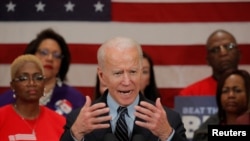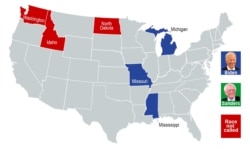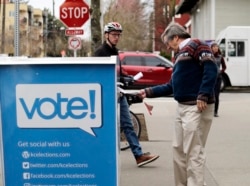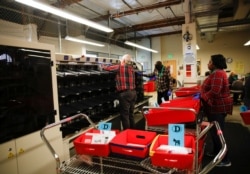Former U.S. Vice President Joe Biden swept to victories Tuesday over Vermont Sen. Bernie Sanders in the Democratic presidential nominating contests in Mississippi, Missouri and Michigan, increasing his lead in the race to oppose Republican President Donald Trump in November's national election.
The outcomes in the Southern state of Mississippi and the Midwestern state of Missouri, projected by news media exit polls, could set the stage for possible Biden wins in other states that voted Tuesday, in the latest in a string of Democratic party primaries.
Based on pre-election polls, the results in Mississippi and Missouri had been expected, especially in Mississippi with its significant African-American population, a bloc of voters who have favored Biden in other states. In Missouri, exit polls showed that Biden also won the African American vote as well as those who called themselves political moderates or conservatives.
But the Midwestern state of Michigan was the key prize among six states that voted Tuesday, with 125 delegates at stake to the Democrats' national presidential nominating convention in July.
Michigan, the U.S. auto manufacturing hub, could also prove pivotal in the presidential election since it was one of a handful of Midwest "rust belt" states Trump unexpectedly won in 2016 on his path to a four-year term in the White House.
Pre-election polls in Michigan showed the 77-year-old Biden, in his third run for the presidency over three decades, significantly ahead of the 78-year-old Sanders, a self-declared democratic socialist.
Three other states voted in Democratic nominating contests Tuesday: North Dakota, Idaho and the Western state of Washington.
Biden won 10 of the 14 party primaries last week on "Super Tuesday." Additional Biden victories Tuesday could make it difficult for Sanders to overtake Biden for the party's nomination. Convention delegates are won in the state-by-state nominating contests on a proportional basis according to the vote outcome, not winner take all.
Biden entered Tuesday leading with 670 pledged national convention delegates so far, ahead of Sanders's 574 delegates, according to delegate trackers, with 1,991 needed to outright claim the nomination at the party convention.
Advance polling showed Biden also doing well against Sanders in North Dakota and Idaho, while splitting the vote with him in Washington state. In all, 365 convention delegates were at stake in the voting Tuesday that also included Democrats living overseas.
Sanders scored a surprise victory in Michigan's 2016 primary over former U.S. Secretary of State Hillary Clinton that revived his campaign. However, Clinton went on to win the nomination but lose the 2016 election to Trump.
The growing threat of the coronavirus epidemic in the U.S. disrupted the presidential campaign for the first time, with both Biden and Sanders canceling large rallies Tuesday night in Cleveland, Ohio, one of the biggest cities in a state set to vote March 17. Those cancellations may presage a dramatic change in campaigning practices, with both the Democratic candidates and Trump under pressure to limit the use of mass rallies to rev up their supporters.
CNN exit polls of voters Tuesday showed that about half of Democratic voters in Michigan and Washington said they would trust Biden more than Sanders to handle a major crisis as president. In Missouri, the spread was wider, with about 60% saying they trusted Biden more in such a situation.
The exit polls in Michigan and Washington also showed that Democratic voters considered themselves angry at the Trump administration.
The formerly long list of Democratic presidential candidates thinned markedly in the last 10 days, with challengers to Biden and Sanders dropping out of the contest just ahead of Super Tuesday voting a week ago or just after failing to win any states.
Gone from the race are former South Bend, Indiana, Mayor Pete Buttigieg, Minnesota Sen. Amy Klobuchar, former New York Mayor Michael Bloomberg and Massachusetts Sen. Elizabeth Warren.
The Super Tuesday voting started a string of three straight weeks of Democratic contests. In February, four states voted one at a time — Iowa, New Hampshire, Nevada and South Carolina.
Biden lost the first three of those states, a resounding win in South Carolina boosted him to even more success a week ago, even as Sanders won the country's biggest state, California.
"You know, just over a week ago, the press and the pundits had declared the campaign dead," Biden told a crowd Monday in Detroit, Michigan's biggest city. "Then South Carolina spoke. Then Super Tuesday spoke, and the turnout was incredible. And now [Tuesday], Michigan, Mississippi, Missouri, North Dakota, Idaho, Washington state, you will be heard. And Michigan, I'm counting on you in a big way."
Sanders says his progressive campaign is what the country needs more than the moderate positions of Biden, and that he is the best challenger to Trump in the national election eight months from now.
"My point here is to ask you to think that in a general election, which candidate can generate the enthusiasm and excitement and the voter turnout we need?" Sanders asked his supporters in Missouri. "So, if you want to defeat Trump, which all Democrats do, and a majority of independents and some Republicans do, we are that campaign."
Biden and Sanders are scheduled to debate each other next Sunday ahead of the March 17 primary elections in Florida, Illinois, Ohio and Arizona.




